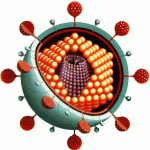Virology
|
14 october 2014 15:45:03 |
| Elucidating Immunologic Mechanisms of PROSTVAC Cancer Immunotherapy (Epidemiologic Perspectives & Innovations) |
|
Tweet Background:
PROSTVAC?, an active immunotherapy currently studied for the treatment of metastatic castration-resistant prostate cancer (mCRPC), consists of a heterologous prime-boost regimen with two different poxvirus-based vectors to provoke productive immune responses against prostate specific antigen (PSA) as the target tumor antigen. A Phase 2 study of PROSTVAC immunotherapy showed significantly improved median overall survival by 8.5?months and is currently being validated in a global Phase 3 study (PROSPECT; NCT01322490). Here, preclinical models were explored to investigate the mechanism of action and immune signatures of anti-tumor efficacy with PROSTVAC immunotherapy with the goal to identify potential immune correlates of clinical benefit.
Methods:
PROSTVAC-induced immune responses and anti-tumor efficacy were studied in male BALB/c mice. Functionality of the induced T cell response was characterized by interferon-gamma (IFN?) ELISPOT, cytotoxic degranulation, multi-cytokine intracellular staining, and in vivo T cell depletion. Tumor infiltrating lymphocytes (TILs) were evaluated phenotypically by flow cytometry.
Results:
The heterologous prime-boost regimen of the two PROSTVAC vectors significantly enhanced the magnitude and quality of activated PSA-specific CD4 and CD8 T cell responses compared to homologous, single vector regimens. PROSTVAC-activated CD4 and CD8 T cells were highly functional as evidenced by expression of activation markers, production of multiple cytokines, and amplified cytotoxic T cell activity. Importantly, PROSTVAC immunotherapy resulted in significant anti-tumor efficacy in a transplantable prostate cancer mouse model. Antigen-spreading occurred in PROSTVAC-treated animals that rejected PSA-expressing tumors, as shown by subsequent rejection of PSA-negative tumors. In vivo CD4 and CD8 depletion revealed that both T cell subsets contributed to anti-tumor efficacy. Characterization of TILs demonstrated that PROSTVAC immunotherapy greatly increased the intra-tumoral ratio of activated effector to regulatory T cells.
Conclusions:
PROSTVAC immunotherapy activates broad, highly functional T cell immunity to PSA and to endogenous tumor antigens via immune-mediated antigen spreading. These preclinical results further elucidate the mode of action of PROSTVAC immunotherapy and its potential causal relationship to extended overall survival as observed in the PROSTVAC Phase 2 study. The clinical validation is ongoing in the PROSPECT Phase 3 clinical study. |
| 142 viewsCategory: Pathology, Virology |
 Genes and post-term birth: late for delivery (Epidemiologic Perspectives & Innovations) Genes and post-term birth: late for delivery (Epidemiologic Perspectives & Innovations)The role of mirroring and mentalizing networks in mediating action intentions in autism (Epidemiologic Perspectives & Innovations) 
|
| blog comments powered by Disqus |
MyJournals.org
The latest issues of all your favorite science journals on one page
The latest issues of all your favorite science journals on one page



